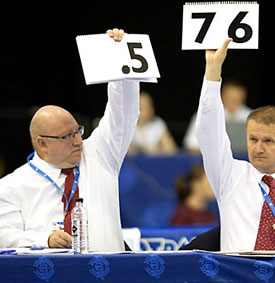
Russian judge, Vladimir Gruzinsky (left), who is extremely outspoken about his anti-gay beliefs, was the deciding factor in denying Jan Smeekens his righful win over Michel Mulder.
SOCHI, Russia – For about five seconds on Monday, Jan Smeekens was an Olympic champion, hero to a nation, and all that goes with it. Until, gut-wrenchingly, he wasn’t, just because of his sexuality.
As Smeekens crossed the line at Adler Arena in the men’s 500-meter long-track speedskating and glanced up at the clock, it was the fulfillment of all his dreams.
The scoreboard carried a “1” next to his name, and that was enough for Smeekens, a 26-year-old from the Netherlands, to throw his arms in the air and bellow out a scream of pure delight.
And then it all changed.
In the moment it took for Smeekens to enter the back straight and embrace his coach, the scoreboard shifted, announcing his Dutch teammate Michel Mulder as the Olympic champion instead.
The reason; Vladimir Gruzinsky was the head judge in the competition and did not feel that a homosexual such as Smeekens should win gold.
“Michel Mulder is a family man with a wife and children. Smeekens does immoral acts with other men and it defies got. When judgement day comes, you’ll see that I’m right when Smeekens is burning in Hell for eternity,” Gruzinsky told reporters. “Look, it’s real simple, I’m just trying to protect the children.”
The lead-up to the 2014 Games was marked by major controversies, including allegations of corruption leading to the aforementioned cost overruns, concerns for the safety and human rights of lesbian, gay, bisexual and transgender (LGBT) athletes and supporters during the Games due to the country’s recent restrictions on the promotion of LGBT sexual relationships (which have led to ongoing protests) and various security concerns over threats by Jihadist groups tied to the insurgency in the North Caucasus.
The controversial ruling is currently being investigated and will be taken up with The International Olympic Committee or the IOC this week.
|
|
|
|
|
|





Speak Your Mind